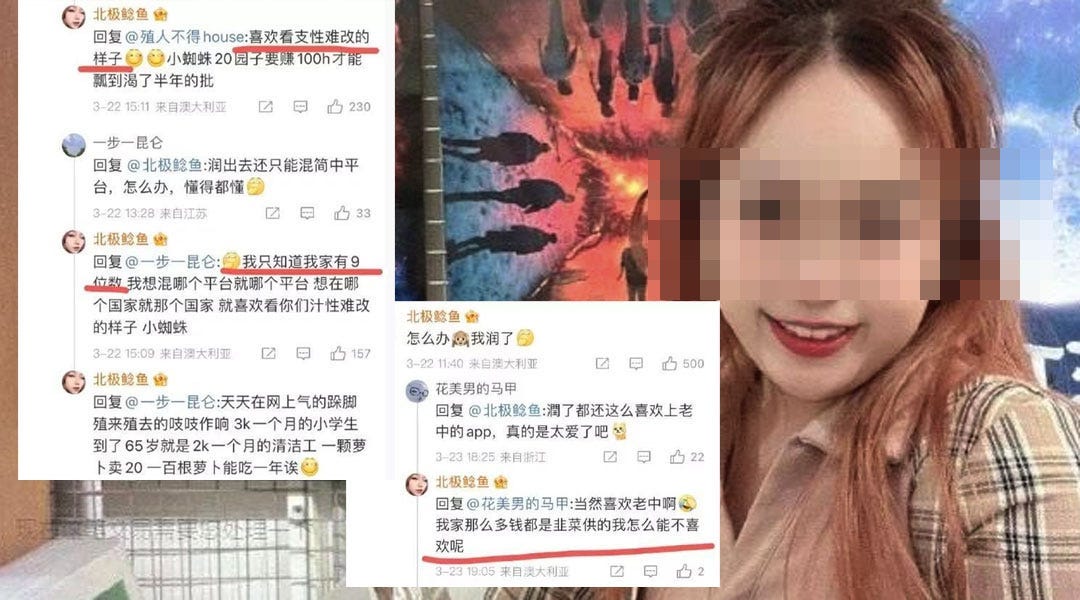Welcome to RealTime Mandarin—a multimedia resource to immerse you in the latest Chinese language trends, inspire you to practice and improve your Mandarin every week, and empower you to communicate with confidence.
Subscribe now to get the next issue straight to your inbox!
An internet user known as Arctic Catfish (北极鲶鱼 běijí niányú) has come under fire for showing off her wealth and sharing offensive posts online.
The third generation of a government official (官三代 guān sāndài) — i.e. the granddaughter of a senior Communist Party member —she lives and studies in Australia, and regularly shares images online of her extravagant lifestyle there.
In February, in response to one of her posts, one of her followers asked why she still used Chinese social media platforms if she was so happy to have left the country:
You've left the country, so why do you still use Chinese social media platforms? Do you really like them?
都出国了,还用国内老社交平台,真的很喜欢吗?
In response, she said:
My family’s money came from gullible Chinese like you, so how could I not like using Chinese social media platforms? My family's wealth is in the hundreds of millions. So I can be in whatever country I want to be, and use whatever social platform I like to. Using Weibo means I can watch you Chinese being stubbornly Chinese.
我家的钱都是韭菜供的,怎么可能不喜欢呢?,我家有9位数存款,想混哪个平台就哪个平台,想去哪个国家就哪个国家,我就是喜欢看你们支性难改的样子,小蜘蛛。
The online conversations which followed used slang words we’ve learned in this newsletter, like:
韭菜 jiǔ cài - Chinese garlic chives, a slang term of gullible investors and customers who keep coming back no matter how much companies take off them
润了 rùn le - to escape from China during the strict pandemic lockdowns
坑了 kēng le - to cheat or deceive someone
Her posts caused upset and invited criticism online:
Her remarks not only showed off the wealth of her family, but also insulted China and the Chinese people with vulgar language, which made netizens very angry.
她的言论不仅炫耀了家族的财富,更是用低俗的语言侮辱了中国和中国人,这让网友们非常愤怒。[3]
According to subsequent posts, her grandfather is a retired official in Shenzhen who made lots of money probably by being corrupt (可能贪了). The local authorities quickly announced they were investigating:
Her words not only undermined public morals and values, but also caused trouble for her retired grandfather.
她的话不仅触犯了公共道德和价值观,还坑了一个退休爷爷 [3]
So that’s what we explore this week: The language describing over-privileged youth, the invisible barrier between those who leave China and those that don’t, and the colourful and sometimes derogatory language used to describe that difference.
Finally, thanks to Geremie Barmé for suggesting this topic. It links nicely to an excellent essay by him about “huminerals” or 人矿 rén kuàng. (If you spot any news stories which could be a good fit for this newsletter please do share them by replying to any of my emails!)
Favourite Five
1. 炫富 xuàn fù
flaunting wealth
她在澳大利亚读书,但她很少晒读书的画面,大部分时间在炫富 - She is studying in Australia, but she rarely posts pictures of her studying. Most of the time she shows off her wealth. [1]
2. 支性难改 zhī xìng nán gǎi
stubbornly Chinese
想去哪个国家就哪个国家,我就是喜欢看你们支性难改的样子 - I can be in whatever country I want to be, and use whatever social platform I like to. Using Weibo means I can watch you Chinese being stubbornly Chinese. [3]
More: This is originally from the Hindu word for Chinese (चीन pronounced “cheen”) which was then imported and transcribed into Chinese as 支那, and then Japanese along with Buddhism in the 9th century. It later became a derogatory term used by Japanese during its occupation of China. Read more in this Week’s Phrase of the Week.
3. 大义灭亲 dà yì miè qīn
to bring your family member that has undermined the interest of the nation to justice
很多网友表示,这是大义灭亲,说明了大多数人的底线是不能被跨越的 - Internet users said that this is like bringing your family member to justice . It shows that the moral baseline of most people cannot be crossed. [3]
Note: The idiom is used ironically here, because she has inadvertently put her grandfather in the spotlight who, according to her posts, made his money through leveraging his position as a government official.
4. 林子大了,什么鸟都有 lín zi dà le, shén me niǎo dōu yǒu
in a big forest, there are all sorts of birds; wherever there is people, there are bad people
俗话说:林子大了,什么鸟都有!在“北极鲶鱼”之前,早就有过各种炫富的人出现 - As the saying goes, there are all sorts of birds in a big forest. Plenty of others did the same well before Arctic Catfish came out flaunting her wealth. [4]
5. 一人得道,鸡犬升天 yì rén dé dào, jī quǎn shēng tiān
when one becomes immortal, their chickens and dogs all fly to heaven; when a someone gets to the top, all their friends and relations go with them
大家纷纷在网上对其进行了声讨,并要求严查这位“一人得道,三代人升天”的爷爷 - She was condemned online and people demanded that her grandfather be investigated, whose privileged position may have been used by his younger family members for their own profit. [4]
Consuming the Conversation
Useful words
6. 贬损 biǎn sǔn
disparage, belittle, insult
该事件的重点根本不是贪腐而是贬损国人 - The focus of the incident is not corruption at all, but the disparagement of the Chinese people. [2]
7. 诬蔑 wū miè
slander
现在一个中国人却以这种诬蔑性的方式来称呼自己的同胞 - Now a Chinese is referring to her compatriots in such a slanderous way. [2]
Related: 诽谤 fěi bàng - to slander or defame somebody
8. 劣根 liè gēn
bad roots; inherent flaw
钟女炫富事件的“支性难改”和“小蜘蛛”就是在贬损国人,她的言行暴露了劣根 - The anti-Chinese words used by Zhong to show off her wealth are derogatory towards Chinese people. Her words and deeds have exposed her innate immorality. [2]
Note: Usually written as 劣根性 liè gēn xìng, which was first coined by historian Guō Dìngshēng 郭定生 in The Ugly Chinaman 丑陋的中国人, which Zoe discusses more in the podcast.
9. 险恶 xiǎn è
sinister
用这样的话来攻击自己的同胞,足见其用心之险恶 - Using such words to attack one's own compatriots shows her sinister intentions. [4]
10. 摆谱 bǎi pǔ
show off
在外发生争执不可摆谱撒泼,更不可胡乱显示实力 - When there is a dispute it’s best not to show off and make a scene, and certainly not show off your strength. [4]
Note: A north eastern dialect word.
Three-character phrases
11. 虚荣心 xū róng xīn
vanity
炫富除了满足一下虚荣心与优越感,还输出“有钱任性”的错误消费观 - Showing off wealth not only satisfies her vanity and gives her a sense of superiority, but also leads to people believing that money can solve all problems. [1]
12. 现世报 xiàn shì bào
get punished quickly for the evil one has just done; karma
孙女炫富能把爷爷坑到被查真是现世报 - The granddaughter showing off her wealth leads directly to her grandfather being investigated. That really is karma. [2]
13. 说漏嘴 shuō lòu zuǐ
let something slip















